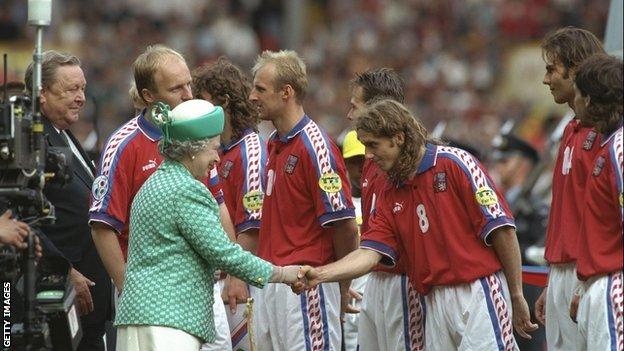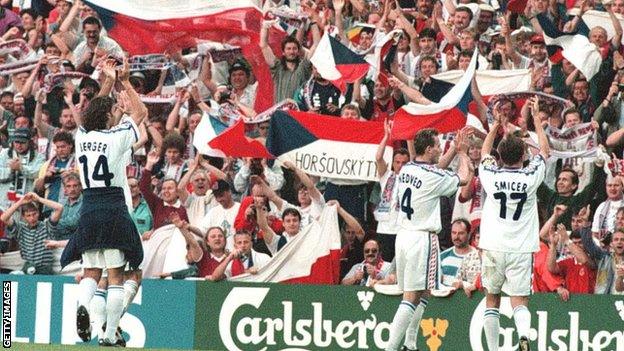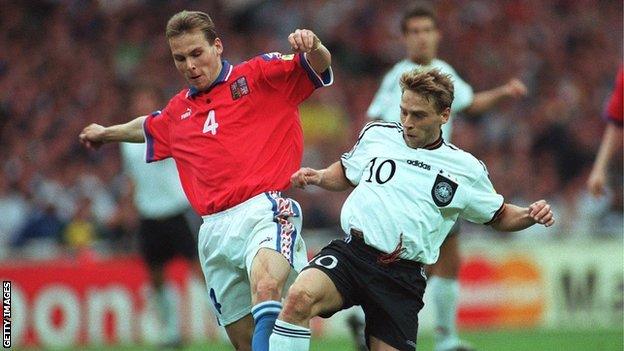Euro 2020: Are Czech Republic finally ready to surpass Euro 96 high point?
- Published

The Czech Republic began and ended Euro 96 with defeats by Germany but memorably knocked out France and Portugal
Euro 2020 on the BBC |
|---|
Dates: 11 June-11 July. Venues: Amsterdam, Baku, Bucharest, Budapest, Copenhagen, Glasgow, London, Munich, Rome, Seville, St-Petersburg. Coverage: Live on BBC TV, BBC Radio 5 Live, iPlayer and the BBC Sport website and app. Click here for more details |
Mention Wembley to a Czech Republic fan and it brings to mind one of the greatest moments in the country's football history.
Twenty-five years ago this summer, the Czechs - at that stage only an independent nation for three years - came agonisingly close to winning the European Championship, a golden goal from Germany's Oliver Bierhoff eventually ending their chances.
They are outsiders again this summer but a victory over Scotland and draw with Croatia in their opening matches means they are certain of reaching the last 16, and if they avoid defeat against England on Tuesday they will win Group D.
They have made it to a major final at Wembley before and beat the Three Lions in qualifying for this tournament, so is a repeat of 1996 out of the question? And could they even match the feats of the famous Antonin Panenka-inspired Czechoslovakia team of 1976 and win the tournament?
'The country's president sent me tactical instructions'
Dusan Uhrin Sr, the manager for Euro 96, had quite the eventful summer.
Not only did he lead his team to a famous finals appearance, he also found himself having to deal with an unexpected overture from his country's president and met the Queen, having initially turned down a chance to do so.
Three months before the tournament, Uhrin was invited to an official reception for the Queen's visit to the Czech Republic, first at Prague Castle and later at the British Embassy. He refused both.
"Germany, who were also our first opponent in the group, played a game in Hannover at that time. So I sat in my car and drove to Germany to watch them. I had to prioritise my coaching obligations, not the Queen," he told BBC Sport.

Patrik Berger and Pavel Nedved were driving forces in midfield at Euro 96
"In the end, she gave us our silver medals anyway [after Euro 96]. It is an amazing memory."
The success of that team, featuring Patrik Berger, Karel Poborsky and Pavel Nedved, was based partly on the talent of those players and partly on the unity of the team.
"When you have a good collective, you can create an atmosphere," adds Uhrin. "The whole country supported us, including the president Vaclav Havel, who even sent us two letters with tactical instructions and his proposed starting XI."
They beat Italy in the group, then overcame Portugal and France in the knockout stage.
The unexpected success gave Vladimir Smicer - who would go on to play for Liverpool - a problem.
He had set a date for his wedding for the latter stages of the tournament and, as the Czechs advanced, Smicer did not know if he would be allowed to return to Prague for the ceremony.
"He had to postpone the wedding twice," Uhrin says. "I told him that if we won the semi-final, he could do as he wished. In the end, we beat France, so Vlada could fly to Prague. He left only for one day, married and flew back to England. For him, it was great to have a wedding just before the final, and there was a full Old Town Square."
A second golden generation in a decade emerges
Euro 96 was just the start for that generation of Czech players.
Many of the squad got their move abroad, including Smicer (Lens), Poborsky (Manchester United) and Nedved (Lazio), the latter winning the Ballon d'Or in 2003.

Pavel Nedved (left) went on to star for Juventus for eight years
Uhrin left the team in 1997, and, in 2001, Karel Bruckner took over as coach. But the Czechs were finding it difficult to build on their success from 1996, failing to qualify for consecutive World Cups in 1998 and 2002.
But Bruckner was able to choose from another fine group of youngsters, including goalkeeper Petr Cech, midfielder Tomas Rosicky and striker Milan Baros. With their attractive style of football, they came close to another Euros success in 2004, but were beaten by eventual winners Greece in the semi-finals.
It proved to be the peak of that generation. At the 2006 World Cup, the Czechs did not get out of their group and have not qualified since.
As players like Nedved and later Rosicky retired, the country suffered with a lack of quality replacements available. The Euros have since proved disappointing - they could not get out of their group in 2008 and 2016, though they did reach the quarter-finals in 2012.
There are several possible reasons for the Czechs' fall. The country's leading clubs relied heavily on foreign imports to earn Champions League qualification but, more than anything, Rosicky, Nedved and co proved to be extreme cases who could not be easily replicated via youth development.
On track for a repeat of 1996?
The 2018 appointment of coach Jaroslav Silhavy has proved a turning point and the Czech Republic are now able to compete with Europe's elite.
Silhavy has benefited from Slavia Prague's achievements, as the club reached the Europa League quarter-finals twice in the past three years, knocking out Leicester City and Rangers this season.
The win over England in qualifying for the Euros was a high point and they earned an impressive 1-1 draw with world number one side Belgium in qualifying for the 2022 World Cup. Belgium's manager Roberto Martinez described them as a "very modern team".
Silhavy relies on a solid defence and quick, direct play.
Midfielder Tomas Soucek was one of the best players in the Premier League last season at West Ham United, and he is helped by the Hammers' right-back Vladimir Coufal.
The biggest goal threat comes from the Bayer Leverkusen forward Patrik Schick, who has scored in both Euro 2020 matches so far, including from near the halfway line against Scotland. He has grown into the role of the country's leader.
Watch all the angles of Schick's halfway wonder goal
"Finally we have players who are able to fight against the best teams," David Cermak, a journalist for MF Dnes, says.
"Definitely, we don't have better players than England or Belgium, but they are able to make their day difficult thanks to their aggression, cleverness and ferocity."